Oasis on the Adriatic where Ukrainians and Russians have gone to escape war

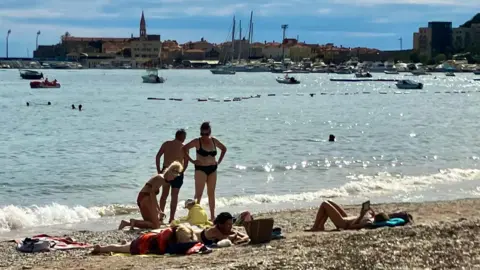 BBC
BBC“Our people respect the Russian and Ukrainian people,” says Savvo Dobrovic. “I simply haven’t noticed any bad relations.”
It sounds like a recipe for tension and confrontation: tens of thousands of people from opposing sides in a bitter, protracted war descending on a small Balkan nation with its own very recent memories of conflict.
But Montenegro has managed the influx so far.
Since February 2022, Ukrainian refugees and Russian exiles have fanned out across Europe, fleeing war, conscription and Vladimir Putin’s rule.
More than four million people have fled Ukraine for temporary protection in the European Union – to Germany and Poland and elsewhere.
But beyond the EU, Montenegro has let in in more than 200,000 Ukrainians, making it the highest per capita Ukrainian refugee population in the world.
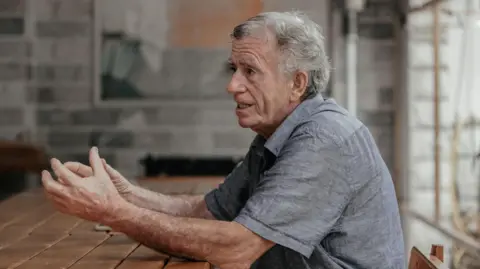
“Montenegrins are very patient, they are people who want to help,” says Dobrovic, a property owner in the Adriatic resort of Budva.
The word polako, meaning “slowly”, is integral to their way of life.
“It amazes me – they’re a mountain people, but all that’s left from that noisy temperament is a desire to hug you,” says Natalya Sevets-Yermolina, who runs the Russian cultural centre Reforum in Budva.
Montenegro, a Nato member and candidate for EU status, has not been without its problems.
It has a substantial ethnic Serb population, many of whom have pro-Russian sympathies, and six Russian diplomats were expelled two years ago on suspicion of spying.
But it has won praise for its response to the refugee crisis – in particular its decision to grant Ukrainians temporary protection status, which has now been extended until March 2025.
The most recent figures from September last year show more than 10,000 had benefited, and the UN says 62,000 Ukrainians had registered some legal status by then. That is nearly 10% of Montenegro’s population.
Thousands more have come from Russia or Belarus.
For all of these groups Montenegro is attractive for its visa-free regime, similar language, common religion and Western-leaning government.
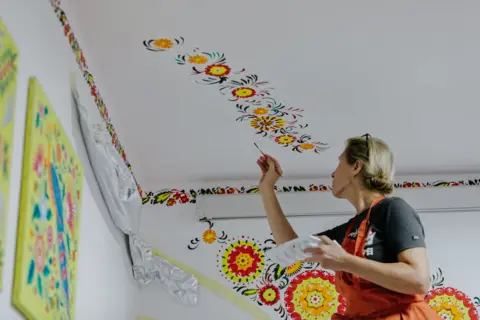
That welcome does not always extend to their quality of life.
While there are plenty of jobs for immigrants in coastal areas, they are often seasonal and poorly paid. Better quality, professional work is harder to find. The luckier ones have been able to retain the jobs they had back home, working remotely.
Another difficulty is that it is almost impossible to get citizenship here, a problem for those who, for whatever reason, are unable to renew their passports.
There has been a strong Russian presence in Montenegro for years, and it has a reputation, perhaps unfairly, as a playground for the very rich.
Many Russians and Ukrainians have property or family connections, but there is also a large contingent who ended up here almost by chance, feeling completely lost.
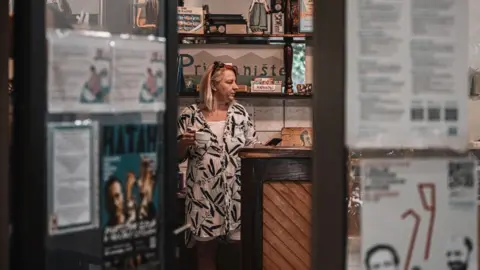
It was for them that non-profit shelter Pristaniste (Haven) was set up.
Based in Budva, it gives the most desperate arrivals a safe place and a warm welcome for two weeks as they find their feet.
They are given help with documentation, hunting for jobs and flats, and Ukrainians can also come for two weeks as a “holiday” from the war.
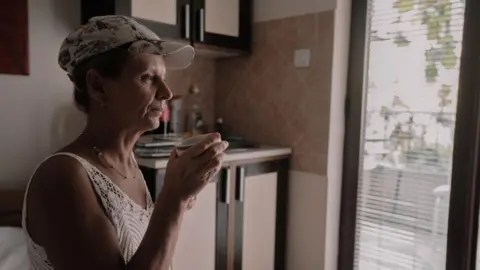
Valentina Ostroglyad, 60, came here with her daughter a year ago from Zaporizhzhia, a regional capital in south-eastern Ukraine that comes under repeated, deadly Russian bombardment.
“When I first arrived in Montenegro I couldn’t handle fireworks, or even a roof falling in – I associated it with those explosions,” she said.
Now she is working as an art teacher and enjoying her adopted country: “Today I went up to a spring, admired the mountains and sea. And people are very kind.”
The ongoing grimness of the war ensures that Ukrainians keep coming, no longer able to endure the pain and suffering at home.
Sasha Borkov, a driver from Kharkiv, was separated from his wife and six children, aged four to 16, as they left Ukraine in late August.
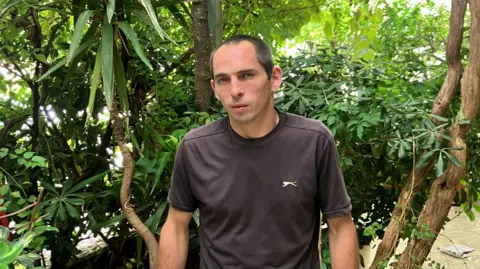
He was turned back at the Polish border – he previously did jail time in Hungary for transporting irregular migrants and is banned from the EU. His family were allowed to continue to Germany while he, after a tense few days travelling around Europe, was finally allowed to touch down in Montenegro.
Visibly stressed and exhausted, he described how the war had finally driven him and his family from their home.
“When you see and hear every day houses being destroyed, people being killed, it’s impossible to convey,” he said.
“Our flat isn’t damaged but windows get broken, and [the bombs] are getting closer and closer.”
Borkov said he had been looking at the possibility of going to Montenegro since the start of the war: “[Pristaniste] took me in, gave me food and drink, a place to stay. I rested, then I started looking for work.”
He has already found a job and his family are due to join him here. He is applying for temporary protection, and a place at a Ukrainian refugee centre.
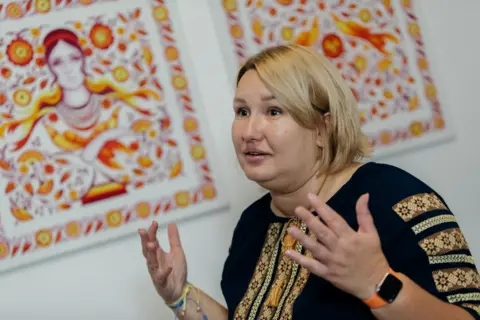
Elsewhere in Budva, Yuliya Matsuy has set up a children’s centre for Ukrainians to take lessons in history, English, maths and art – or just to dance, sing and watch films.
Many were traumatised by war, she says: “They weren’t interested in the mountains or the sea, they wanted nothing.”
“But when they started interacting, their eyes were smiling. Those children’s smiles and emotions were something that’s impossible to convey. And only then we understood we were doing the right thing.”
Now most are settled. The younger children learned Montenegrin and now attend local schools, while the older ones have continued their learning remotely at Ukrainian schools.
Both charities have Russian volunteers, which has helped foster good relations between the Russian and Ukrainian communities here.
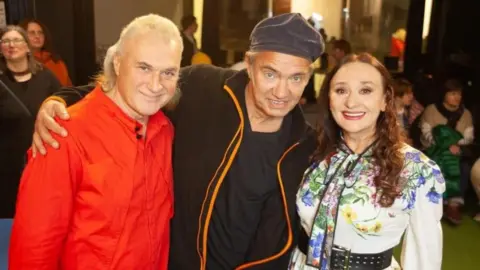 Ruslan Sukhushin/Facebook
Ruslan Sukhushin/FacebookOther parts of Europe have seen occasional friction. At the start of the war, Germany recorded a rise in attacks on Ukrainians and Russians.
But there has been little of that so far in Montenegro.
There is a sense of tolerance here and Pristaniste and its volunteers have had a role in promoting it.
Sasha Borkov distinguishes between Russians he has met in Budva and those fighting the war in Ukraine.
“People here are trying to help, they’re not doing anything against our country, against us, against my children, [unlike] those who fire at and destroy our houses, and say that they’re liberating us.”
Friendships have grown among volunteers and residents, and between residents, and one Russian-Ukrainian couple who lived at Pristaniste recently married.
Empathy is a major factor. A recent talk in Budva by Kyiv-based journalist Olha Musafirova about her work, in Ukrainian, had Russians in the audience in tears, horrified by their country’s actions.
For Ukrainian actor Katarina Sinchillo, Russian diasporas can vary and Montenegro’s is “sensitive”.
“I think the people who live here are a somewhat different community because it’s the intelligentsia,” she says, “educated people who can’t live without the arts.”
Russian-Ukrainian joint projects are vanishingly rare.
But Sinchillo set up a theatre here, with husband and fellow actor Viktor Koshel, using actors from all over the former Soviet Union.
Their plays are well attended, she says: “Progressive Russian people, who are helping Ukraine, go with interest and pleasure.”
Koshel says the environment here is perfect for such contacts. ”Here the countryside is heavenly, it takes you away from those urbanist, gloomy, depressive moods, political propaganda etc. You go to the sea and all that disappears.”
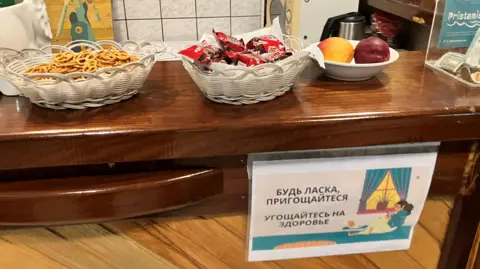
They have also collaborated with veteran Russian rock musician Mikhail Borzykin, who has seen big changes in the Russian diaspora over the past three years.
Before the war, he says, “fierce arguments” about Putin in the Russian community were commonplace, but the recent influx of anti-war immigrants created a different atmosphere.
“The overwhelming majority of young people who have come here, they of course understand the horror of what’s happening, so there is agreement on the main questions,” he says.
As for the pro-Kremlin former members of Russia’s corrupt elite, who he calls the vatnaya diaspora, they are sitting quietly in the properties they bought in Montenegro years ago.
“Conflicts are not aired in public,” he says.
Borzykin is part of a volleyball group of Russians, Belarusians and Ukrainians and says they are “all on the same wavelength”.
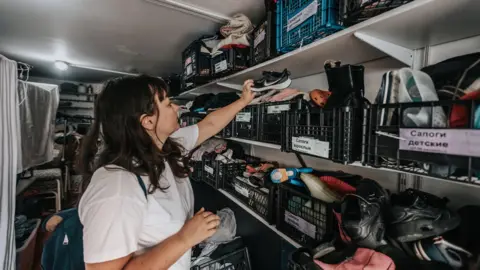
Despite the relatively warm welcome, the future of some immigrants remains uncertain.
Strict citizenship laws mean many of them will not be able to stay here indefinitely.
Most Ukrainians seem keen to return home if the war ends, assuming they still have homes to go to.
“Currently there’s a huge threat to our lives, but if it ends of course we’ll go home,” says Sasha Borkov. “There’s nowhere better than home”.
But most Russians say it will take much more than the fall of the regime to persuade them to go back permanently.
Natalya Sevets-Yermolina, who comes from the northern city of Petrozavodsk, says she’s not in a hurry.
“I have the problem that it’s not Putin that persecuted me but those little people I lived in the same city with,” she says. “Putin is far away but those who do his bidding will remain, even if he dies soon.”
Borzykin says he too is unlikely to return quickly, as attitudes could take decades to change.
“Germany needed 30 years [after the Nazis] while the new generation came along. I’m afraid I won’t have that long.”
Oleg Pshenichny contributed to this article
World News || Latest News || U.S. News
Source link




